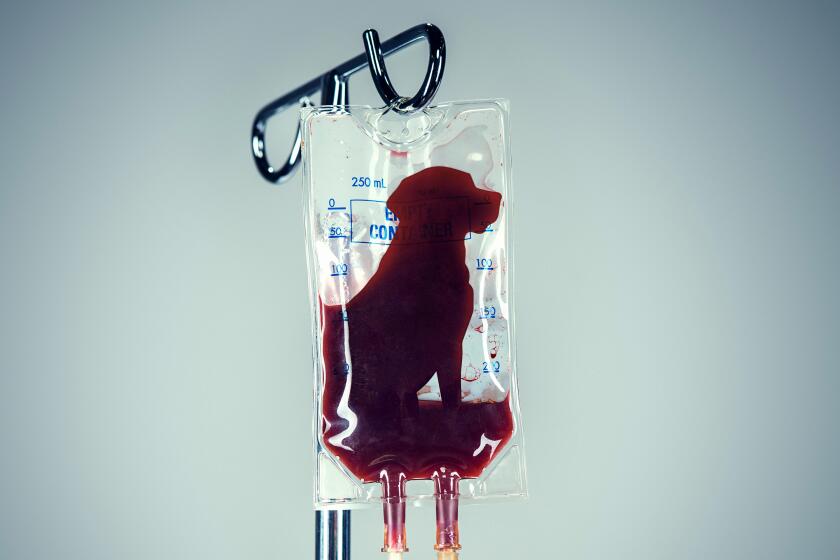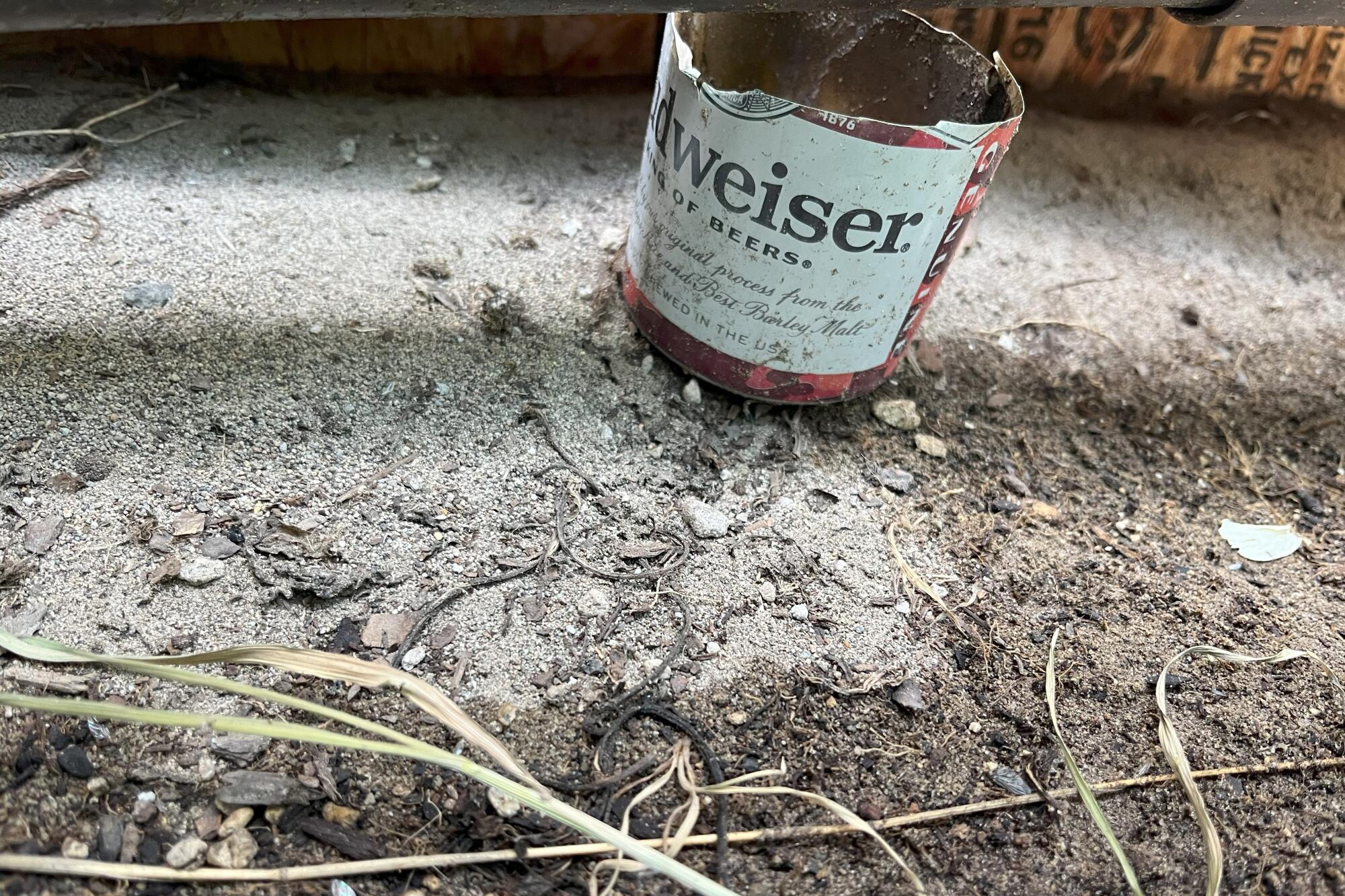
- Share via
In coordinated raids in September, multiple California agencies stormed a network of illegal cannabis-growing warehouses across Oakland while state cannabis regulators singled out a salmon-colored warehouse complex surrounded by 7,000-volt security fencing.
The warehouse building — home to two licensed cannabis operations — was “highly-likely” the conduit that illegal growers used to ship their product into the legal market, a state agent told a judge. Inside the rooms, inspectors found 43,000 plants growing beneath high-intensity lights. None had the tracking tags required to be placed on legal plants.
But the surprise was what was found in the men’s room.
Beside Hot Shot insect foggers and jugs of familiar chemicals were bags labeled in Chinese. Inside each were cellophane packets of wood shavings soaked in unknown pesticides.
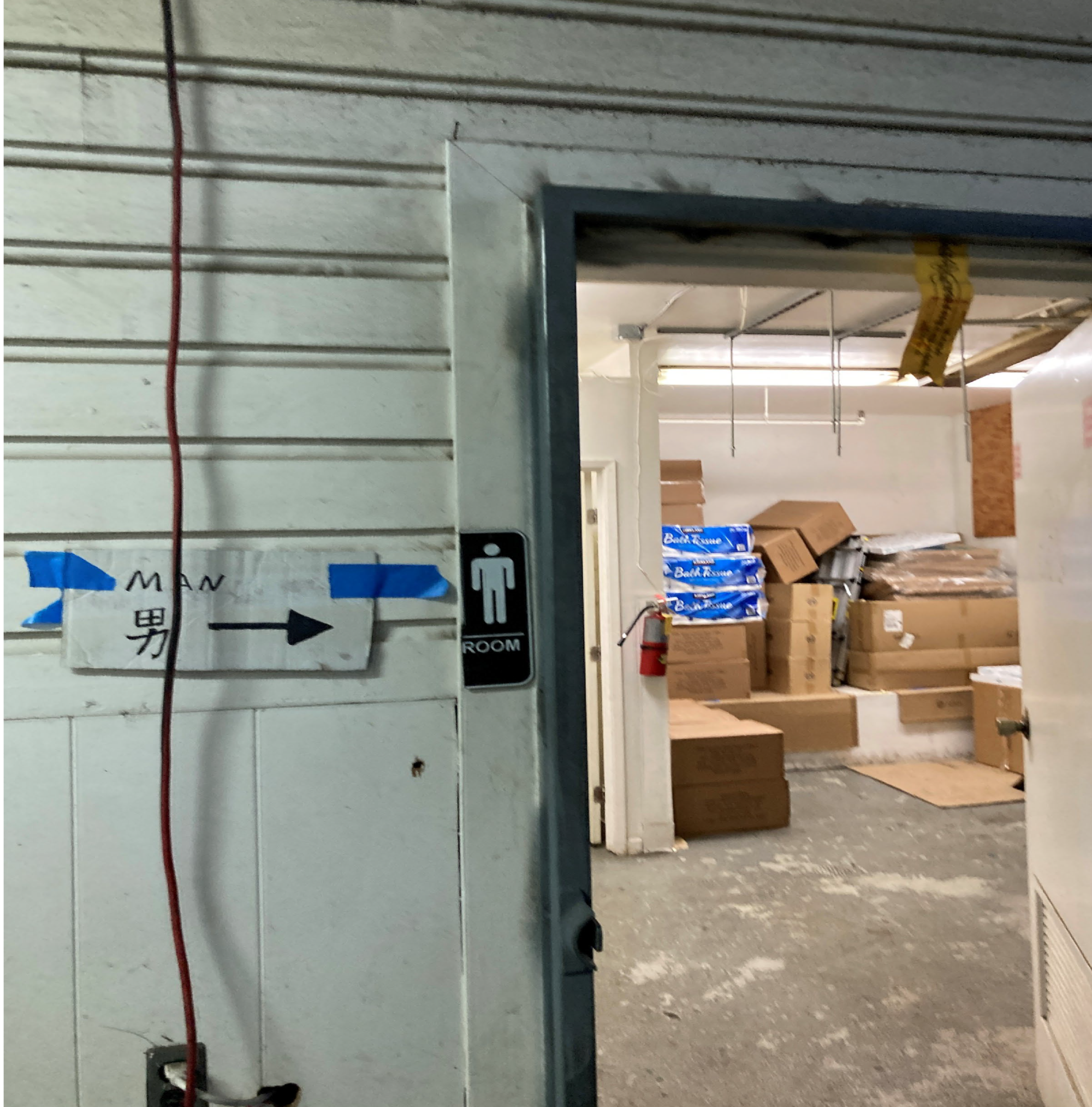
The same kinds of packets had been found earlier last year on illegal farms in Siskiyou County, where lab tests had revealed a cocktail of dangerous insecticides and fungicides that when burned would emit a cloud of pest- and mold-killing smoke. Among the unusual substances was isoprocarb, which is not permitted in the United States; profenofos, an organophosphate so harmful its use here was discontinued in 2016; and fenpropathrin, an acutely toxic insecticide that is fatal if inhaled.
Additional tests would show the warehouse plants were tainted with some of the same pesticides.
Contraband Chinese pesticides present a new challenge for California cannabis regulators as they struggle to keep harmful chemicals out of licensed products. Some of the poisons are so unfamiliar that few chemical analysis labs in the state would be equipped to test for them if California required it.
A Los Angeles Times investigation based on confidential state records, public files, online sales and social networks found that in the last three years, the use of contraband Chinese pesticides on cannabis farms has spread across California.
Yet officials have not issued warnings to alert those working on cannabis farms about the dangers of these chemicals, or mandated that cannabis products sold to the public be tested for them.
But their presence has prompted multiple warnings to law enforcement personnel, including by the state Department of Pesticide Regulation, the California National Guard and the state Environmental Protection Agency.
Internal state warnings caution that short-term exposure to the contaminants can cause headaches, irritated eyes, nosebleeds and sore throats. Hazardous-materials statements and scientific literature show the greatest harm is likely from long-term exposure to low doses, carrying the risk of cancer, memory loss, psychosis, developmental problems in children and death.
“I think the scariest thing with this stuff is what’s going to happen down the road,” said Sheriff’s Det. Sgt. Cory Persing of Siskiyou County, where in 2022 a county environmental health officer, armed with Google Translate on her cellphone, first deciphered the labels on similar packages.
1
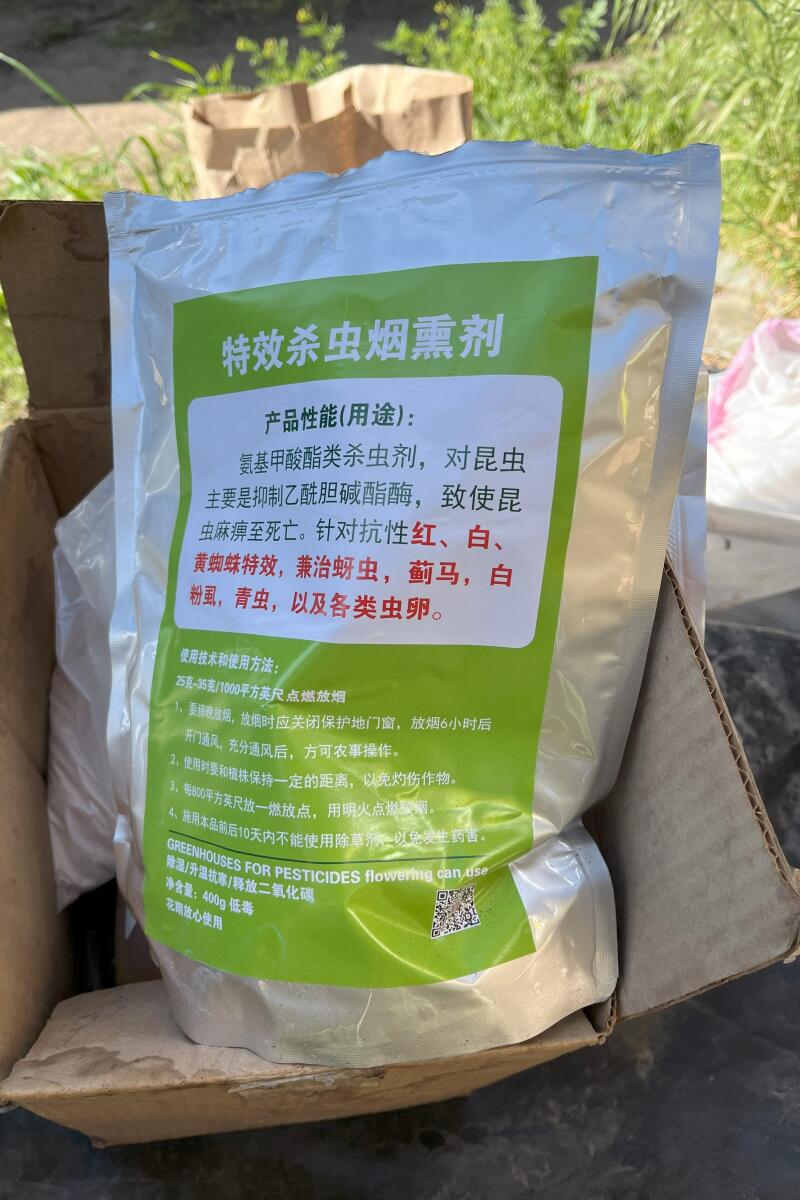
2
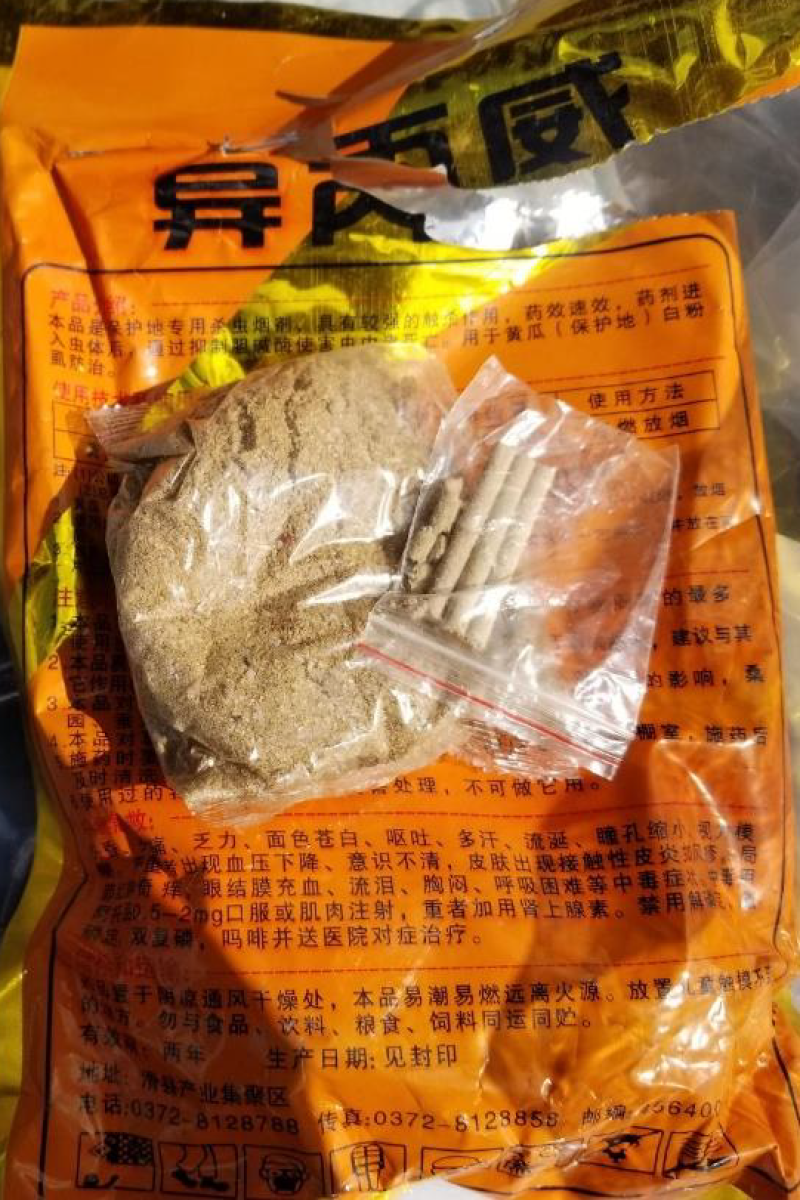
1. A Chinese-labeled fumigant found at a Siskiyou County cannabis farm. California National Guard tests on products with the same label found profenofos, taken off the U.S. market decades ago. (Paige St. John / Los Angeles Times) 2. Packets of pesticide-soaked wood with wicks, intended to be burned as fumigation, found at a Siskiyou County cannabis farm. (Integral Ecology Research Center report to Siskiyou County)
Environmental citations issued by the California State Water Resources Control Board show the Chinese-labeled fumigants predominantly appear on Asian-owned farms, in keeping with agricultural practices.
Smoke fumigation is not common practice in the United States, but is used frequently in China in place of pressure sprayers to aerosolize chemical treatments.
Some of the products appearing on cannabis farms are registered pesticides in China and sold online by vendors in Asia. Others are unbranded, bearing only links to WeChat accounts with California phone numbers and monikers that translate to “whatever bro,” “Spider 1” and “Spider 2.”
An online marketplace aimed at Chinese immigrants in California also carried the unbranded fumigants for sale, as did a Chinese-language site devoted to cannabis cultivation. Both turned out to be associated with a San Joaquin County businessman, Adam Yang, whose social media account included a video demonstration of burning the pesticides inside a cannabis greenhouse and whose Pinterest site offered photos of customer text messages for door-to-door delivery of the contraband pesticides in Los Angeles and nationwide shipping.
The ads even told buyers they could fumigate on buds to be trimmed and sold for smoking. “Rest assured that it can be used normally during the flowering period,” the ads stated.
Yang acknowledged his sites promoted the pesticides, but said they were part of a “collaboration” with a partner he declined to identify. “My role was limited to platform management, and I was not involved in the direct sales or endorsements,” he said by email.
The Chinese-labeled pesticides have shown up now in at least six California counties, at both illegal and licensed growing operations. The poisons were present on half of 25 illegal farms in Siskiyou County raided by a state task force during a July 2023 sting operation that saw three officers require medical treatment after suffering exposure.
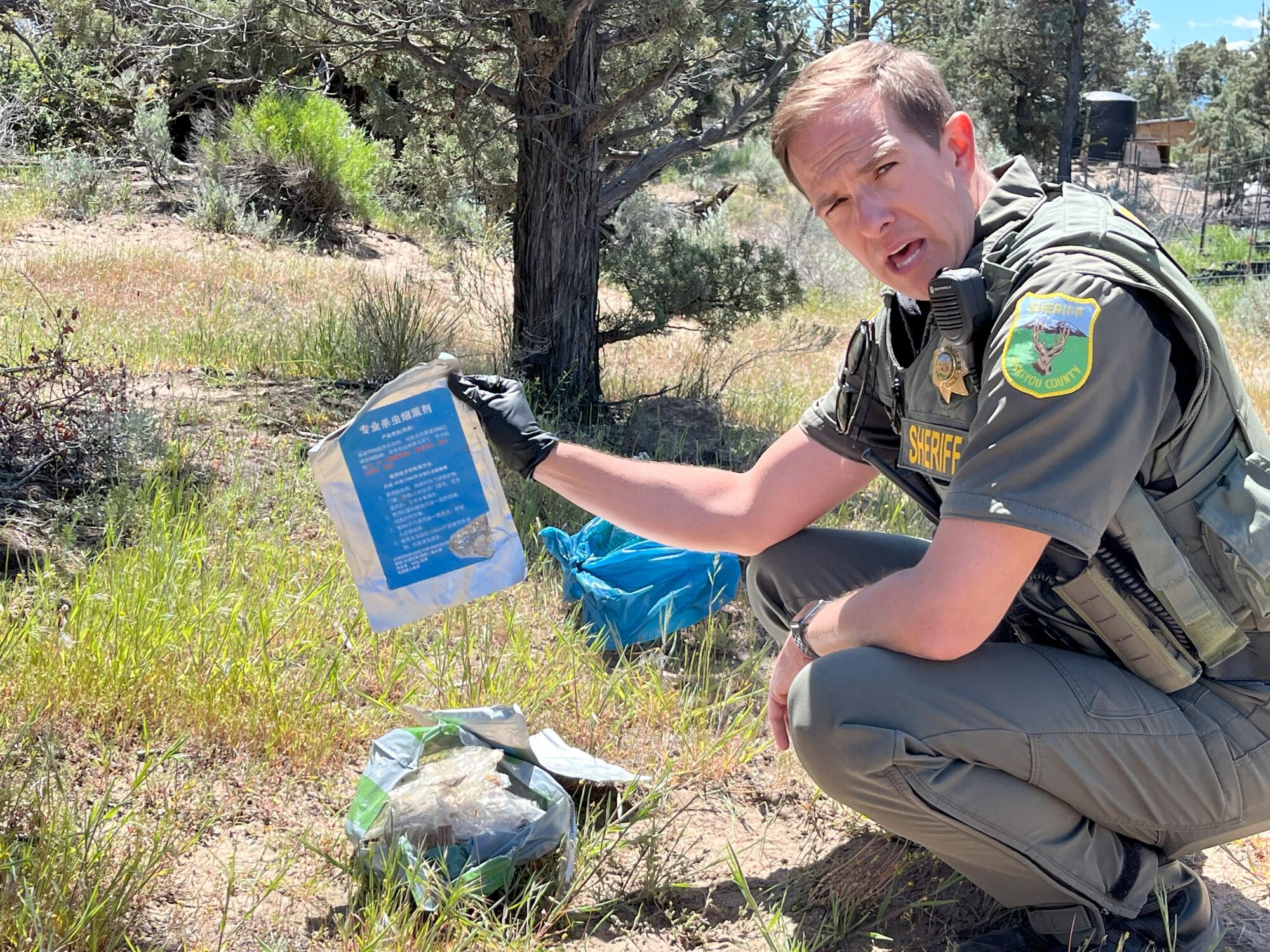
They were also present on five farms raided by Siskiyou County sheriff’s deputies in late April, accompanied by a county health officer who wore protective gear and a respirator to safely bag the pesticides. On one farm, deputies retrieved a large box holding dozens of the Chinese-labeled pesticides from the food pantry, where it had been stashed next to a large sack of rice. More of the fumigants were in a hutch, and inside two greenhouses half-cut beer cans sat by the walls, their interiors filled with the black char of burned pesticide.
One of the farm’s cultivators — who gave only her first name, Feng — said she did not believe the fumigants were dangerous. She pointed to a surgical mask on her face, indicating that she wore protection when burning them.
Reports from a California National Guard lab and a Humboldt County ecology company show most of the packages found initially in Siskiyou County contained blends of insecticides and fungicides. Those tests identified 21 hazardous chemicals. California screens legal weed products for only six of those substances, meaning the bulk of the hazardous pesticides would be undetected in the legal market.
“These sites are highly contaminated with a diversity of chemicals and concentrations,” the report from the Integral Ecology Research Center cautioned, noting each bag contained at least one chemical fatal if inhaled and telling law enforcement personnel to use “extreme caution during all operations.”
The chemicals included five pesticides never permitted for use in the United States, among them chlorthiophos and the nerve agents fenobucarb and isoprocarb.
Also common was profenofos, with early symptoms of exposure that include headache, nausea and dizziness, tremors, vomiting, confusion and unconsciousness. It is fatal if inhaled.
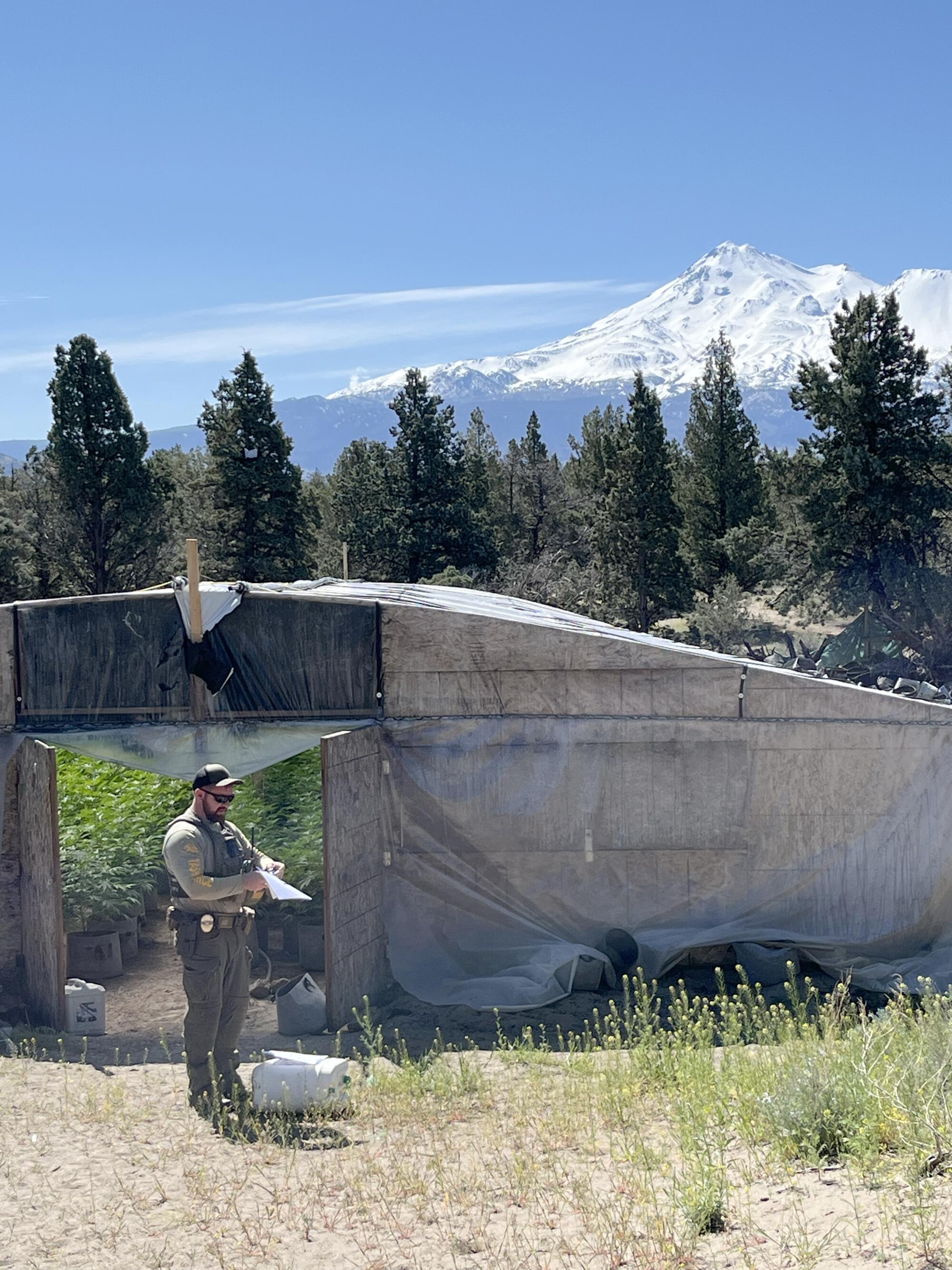
Siskiyou County has begun requiring cannabis enforcement officers to undergo periodic testing for blood poisoning. “Nobody actually tells us what they mean. What is normal? What is high?” said Persing, who said he and his staff frequently have nosebleeds after cannabis farm raids.
California pesticide regulators and the National Guard last year issued their own law enforcement advisories, then broadened them as the Chinese pesticides appeared in Trinity County to the north, Alameda and Contra Costa counties on the coast, and San Diego and San Bernardino counties to the south. The state Department of Fish and Wildlife in March reminded agents to undergo blood poisoning checks.
“We’re concerned not only for first responders, but also users,” said Sheriff’s Det. Chris Bassett in San Bernardino County, whose team found the Chinese pesticides last year on five farms, including two in Los Angeles County. “Hopefully someone requires this stuff to be tested for” on legal weed, Bassett said.
Only six of the 25 pesticides found in the Oakland raid are on the state Department of Cannabis Control’s testing list for products sold in licensed stores. The agency has not moved to add the rest of the chemicals to the list, though police reports and state records show it has encountered the pesticides on weed entering the market.
In October, Siskiyou County deputies stopped a box truck leased by a Los Angeles cannabis distributor and vape manufacturer, VBX Labs. Police reports show the truck carried 4,500 pounds of illegal cannabis trim — typically used to make concentrated oils for vape products — stuffed into 204 black garbage bags.
Previous such illegal loads to licensed distributors had been intercepted, but this time the Department of Cannabis Control sent samples of the confiscated weed to a state agriculture lab for testing. The ensuing order revoking VBX’s cannabis distribution license cited the discovery of a single prohibited chemical — paclobutrazol — commonly used by growers to increase the size and density of flower buds.
The state lab test results reviewed by The Times show the weed in VBX’s box truck also was tainted with 16 other pesticides, including ones unique to the Chinese fumigants: isoprocarb, fenobucarb, fenpropathrin and profenofos. None of those are screened in cannabis products by the state, though other regulations prohibit their use as unregistered pesticides.
The presence of Chinese-labeled pesticides was also omitted from the Department of Cannabis Control order revoking the licenses at the Oakland warehouse raided in September. The agency cited only the presence of two prohibited chemicals routinely tested for in licensed cannabis. It left out lab findings, viewed by The Times, documenting isoprocarb, clothianidin, profenofos and fenpropathrin.
Nor did Cannabis Control agents immediately destroy the Oakland weed upon seeing contraband chemicals in use. Instead, agents quarantined the 43,000 plants and 1 ton of drying weed, telling operators who already had failed to report the fate of 88 prior crops to leave the contaminated plants standing while Cannabis Control decided what to do.
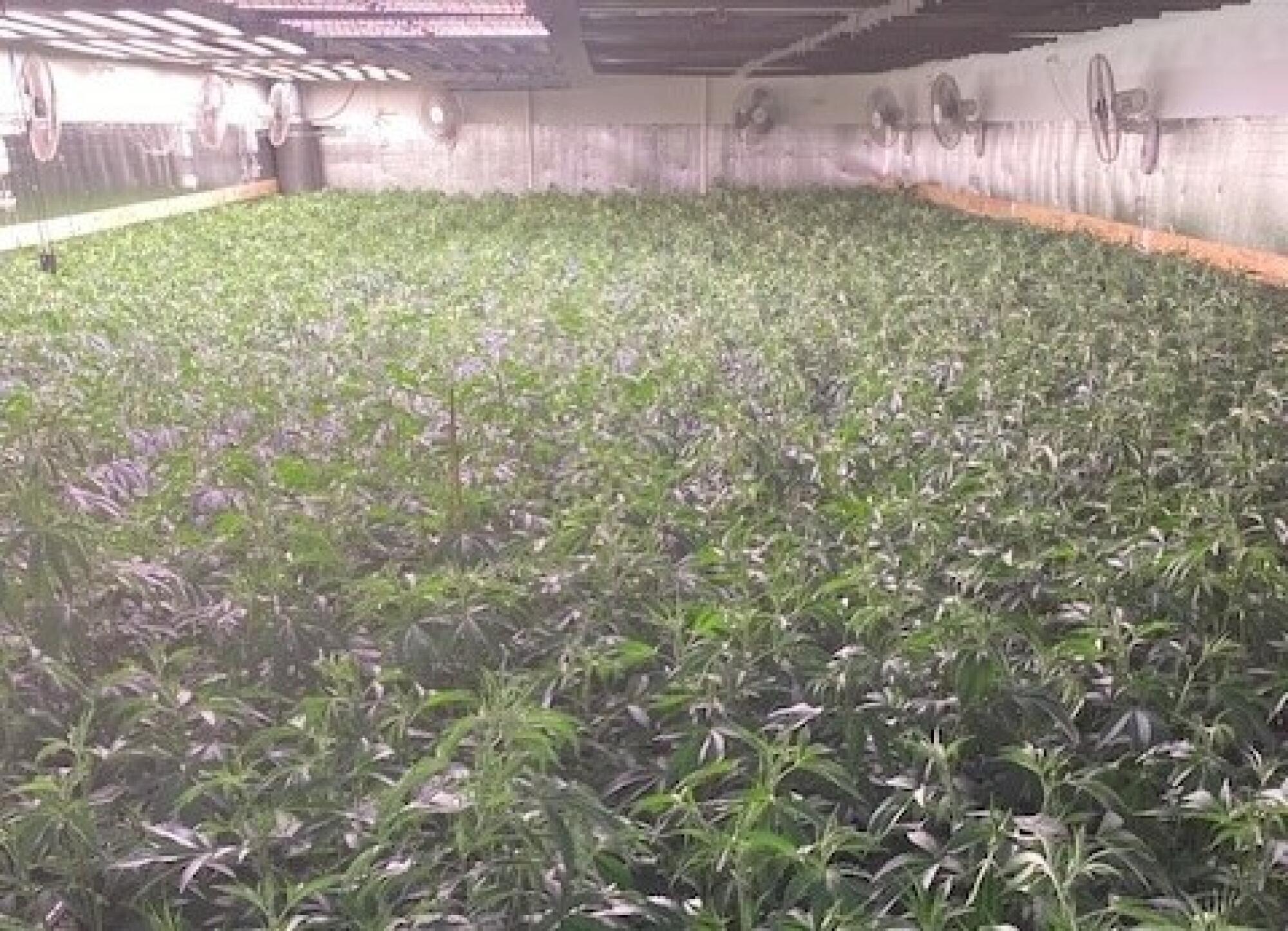
A state agent returned a month later to find some of the plants gone, new ones growing, and more Chinese pesticides on site.
The month after that, yet more quarantined cannabis, including harvested plants, had vanished, according to a state report.
Regulators did not revoke the warehouse licenses until three months after the raid. There was no indication where the tainted weed — a threat to anyone who consumed it — had gone.
More to Read
Sign up for Essential California
The most important California stories and recommendations in your inbox every morning.
You may occasionally receive promotional content from the Los Angeles Times.





